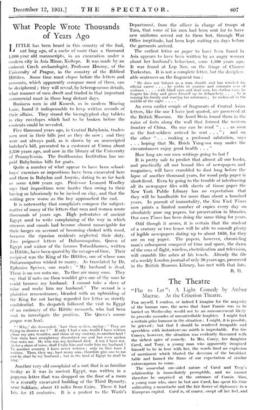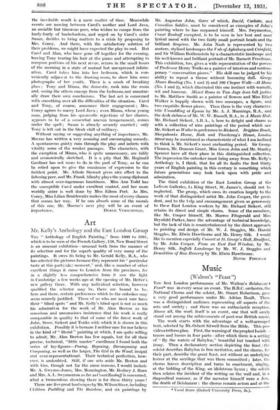The Theatre
"Flat to Let": A Light Comedy by Arthur Macrae. At the Criterion Theatre.
Fon myself, I confess, or indeed I imagine for the majority of the human race, the news that Aunt Fannie was to be buried on Wednesday would not be an announcement likely to provoke cascades of uncontrollable laughter. I might find a certain grim humour in the situation ; I might, it is possible, be grieved ; but that I should be rendered incapable and speechless with instantaneous mirth is improbable. For the Coneys, however, the situation was evidently flavoured walk the richest spice of comedy. In Mrs. Coney, her daughter Carol, and Tony, a young man who apparently imagined himself to be in love with her, the words fired an explosion of merriment which blasted the decorum of the breakfast table and fanned the flame of our expectation of similar extravaganza to come.
The somewhat one-sided nature of Carol and Tony's relationship is immediately perceptible, and we cannot therefore be surprised at the entrance of Cousin Alan, a young man who, since he last saw Carol, has spent his time cultivating a moustache and the fair flower of diplomacy in a European capital. Carol is, of course, swept off her feet, and
the inevitable result is a mere matter of time. Meanwhile events are moving between Carol's mother and Lord Java, an amiable but timorous peer, who wishes to escape from the hurly-burly of bachelordom, and urged on by Carol's sister Susan, decides to bring matters to a crisis by proposing to Mrs. Coney. And there, with the satisfactory solution of their problems, we might have expected the play to end. But Carol and Alan, who have gone off together for the evening, leaving Tony tearing his hair at the piano and attempting to compose portions of his next revue, return in the small hours of the morning in a state of mutual but unexpressed infatu- ation. Carol takes him into her bedroom, which is con- veniently adjacent to the drawing room, to show him some photographs of her youth. Thee e is a crash of breaking glass ; Tony and Minna, the domestic, rush into the room and, seeing the others emerge from the bedroom, not unnatur- ally draw their own conclusions. The last act is concerned with smoothing over all the difficulties of the situation. Carol and Tony, of course, announce their engagement ; Mrs. Coney agrees to marry Lord Java ; even Minna, whose young man, judging from his spasmodic rejections of her charms, appears to be of a somewhat uneven temperament, comes under the spell ; Susan is already securely married ; only Tony is left out in the bleak chill of celibacy.
Without saying or suggesting anything of importance, Mr. Macrae has written a very amusing and encouraging comedy. A spontaneous gaiety runs through the play and infects with vitality some of the weaker passages. The characters, with the exception of Minna, who is quite unnecessary, are tidily and economically sketched. It is a pity that Mr. Reginald Gardiner has not more to do in the part of Tony, as he can be relied upon to give the maximum of expression to the feeblest point. Mr. Athole Stewart gives nice effect to the faltering peer, and Mr. Frank Allenby plays the young diplomat with almost over-ingenuous heartiness. Miss Ann Todd has the susceptible Carol under excellent control, and her more worldly sister is well done by Miss Eileen Peel. As Mrs. Coney, Miss Lilian Braithwaite makes the most of every chance that comes her way. If he can absorb some of the morals of this one, Mr. Macrae's next play will be an event of











































 Previous page
Previous page